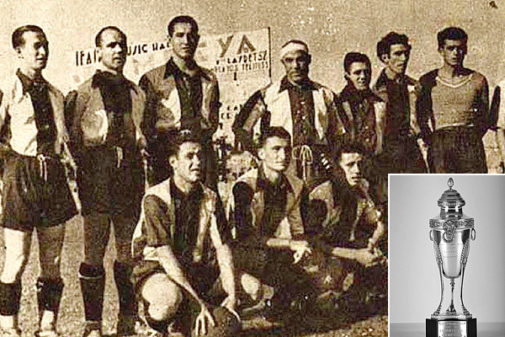It shines in the showcases of the Ciutat de Valencia as an unusual memory, an almost clandestine glass, a constant reminder that, although the defeated do not write history, they do not lose their voice. The Levante has been trying for decades to get that trophy (called the Free Spain Cup) won in 1937 to be recognized for what it is: the title of Spanish champion of that year that the Spanish Federation has always denied .
The last time was in June 2009. Then, the Congress of Deputies approved a Non-Law Proposal, promoted by the United Left and the Catalonia Verds Initiative, for the Federation to study the recognition of the title. However, the organization then chaired by Ángel María Villar rejected it based on an unfavorable report from the Spanish Football History and Statistics Research Center (CIHEFE). The General Assembly supported that decision with forcefulness: 132 votes against, none in favor and two abstentions.
Since then, the Department of Historical Heritage of the Levant , headed by the journalist and historian Emilio Nadal, has not stopped looking for arguments to make that team be considered as champion as Sevilla (who won the National Football Tournament in 1939, a kind of Cup as soon as the war is over) or Athletic, which is recognized as a first title but a 1903 tournament, when the Federation did not even exist.
The Levante will again base its request, which will be raised by the Football Federation of the Valencian Community, on FIFA minutes . They are from November 1937 and they recognize the uniqueness of the Spanish case, with the country and football divided into two sides faced in a civil war. With the rise of July 1936 against the government of the Republic and the advance of Franco's troops towards Madrid, the Spanish Football Federation is seized. Its general secretary and FIFA liaison man, Ricardo Cabot, moves to Barcelona and the national calendar is suspended, but the territorial ones are given freedom to continue organizing competitions.
Soccer did not stop by the War
Where the armed confrontation allows it, football continues, as also certified by the acts of the Valencian Federation of October 36, which authorizes the celebration of a supra-regional championship with supervision of representatives of the Spanish. «In much of the Mediterranean strip, competitions such as the Mediterranean League and the final of the Spanish Cup are organized. In fact, it is negotiated that Atlético and Madrid can participate in the Valencia regional championship, ”says Nadal. On May 31, 1937, Mundo Deportivo collects the creation of the Cup of the Free Spain to close the season and before «the impossibility of organizing a competition that can be called the Cup of Spain by number and quality of participants».
At the same time, with the Federation delegation installed in Barcelona and the competition designed, several tournaments are reorganized in the national area as the territories fall. «From San Sebastián they try to take command also in football. Backed by General Moscardó - after the war president of the National Sports Council - they try to gain recognition from FIFA, claiming that 25% of the affiliates are on their side, ”he says. Of the 18 territorial federations will end up dominated 12, but not yet in 1937.
A goal from Nieto
Thus, on July 18 of that year, in the former stadium of Sarrià, Valencia and Levante, which had left on the road to Spanish and Gerona , the final of the Free Spain Cup was played, and a goal from Nieto in minute 78 he gave the victory to the granotas, who raised a trophy given by the Secretariat of the Presidency of the Republic. In the autumn of that same year, the two delegations of the Federation - one in Barcelona headed by Ricardo Cabot and another based in San Sebastián with the president of the Spanish, De la Riva, at the head - turn to FIFA to resolve the duality. The questions of the maximum world organization were three: if there was the possibility of organizing a single championship, if they could be integrated and if they could share shield. The response of both sides was negative in all three cases. “This is reflected in the FIFA records that we have found, in which it is said that, given the anomalous situation of the Civil War, and as an exception, several competitions are allowed to coexist and the official status of the titles that have been recognized been disputed And so it is done until in 1939 a decree of Franco puts an end to duality, ”reveals Nadal.
This is the argument that Levante wants to take back to the Federation, which will have to decide whether to attend or continue to assess the report presented by CIHEFE in 2009. The main reason given by this report is that the Free Spain Cup was not organized. by the Spanish Federation, which had suspended all competitions in 1936 . The number and quality of the participants is another of the arguments, as well as that the trophy that accredited the champion of Spain was in the possession of Madrid, champion in 1936, which nobody claimed and handed in in 1940, when the championship received the name of the Generalissimo Cup. "With all these investigations, it is concluded that, from the point of view of historical rigor, the Spain Free Cup was a friendly tournament," concludes the report against which the Levant revolts today.
According to the criteria of The Trust Project
Know more- FIFA
- Valencia
- Barcelona
- Madrid
- Congress of Deputies
- IU
- Seville
- Angel Maria Villar
- sports
ReportStartups: Valencia challenges Madrid and Barcelona
CityThe 'war' of electric scooters arrives in Alicante
Interior 29 people arrested for trafficking in human beings and abducting minors from protection centers

